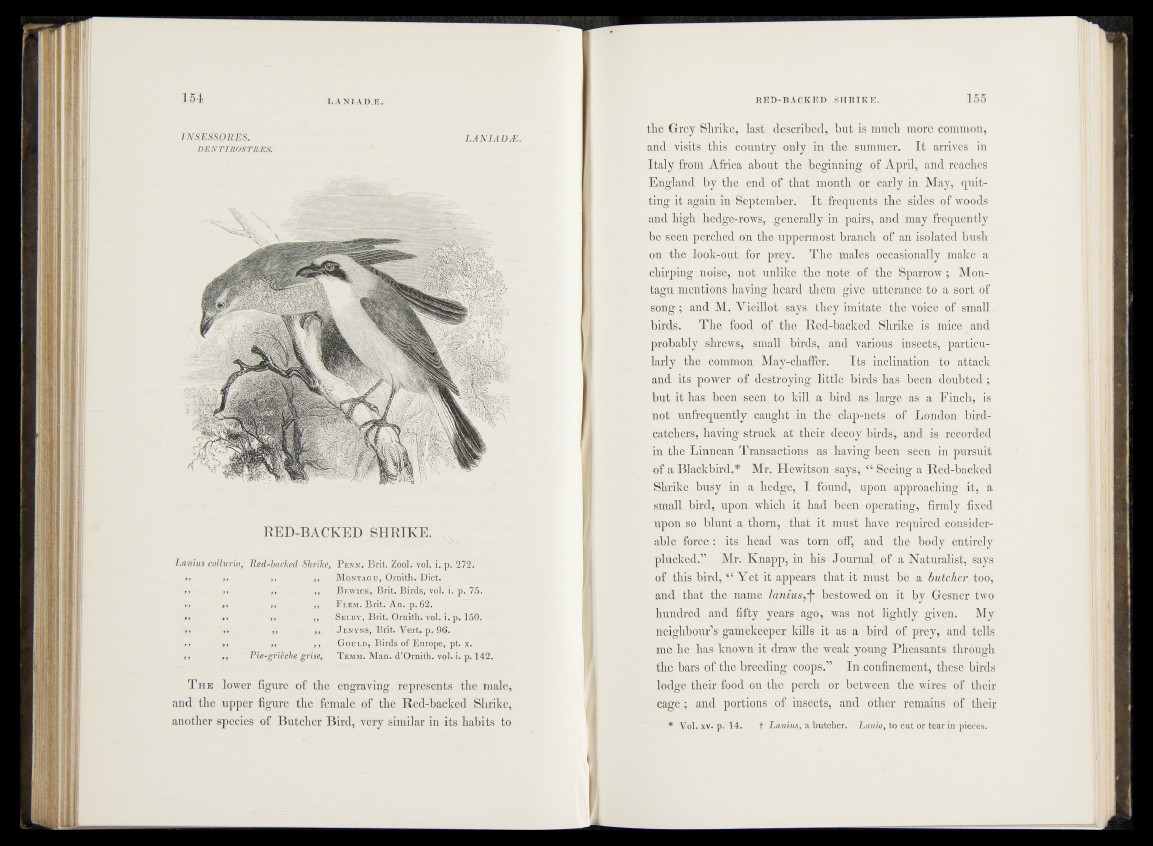
INSESSORES.
DEN TIROS TRES.
LAN I AD Æ.
RED-BACKED SHRIKE.
,, ,, M ,, ,, ontagu, Ornith. Diet. B ewick, Brit. Birds, vol. i. p. 75.
,, ,, F lem. Brit. An. p. 62.
,, ,, Selby, Brit. Ornith. vol. i. p. 150.
,, ,, J enyns, Brit. Vert. p. 96.
,, , , G ould, Birds of Europe, pt. x.
Lanius collurio, Red-backed Shrike, P enn. Brit. Zool. vol. i. p. 272.
Pie-grièche grise, T emm. Man. d’Ornith. vol. i. p. 142.
T h e lower figure of the engraving represents the male,
and the upper figure the female of the Red-backed Shrike,
another species of Butcher Bird, very similar in its habits to
the Grey Shrike, last described, but is much more common,
and visits this country only in the summer. It arrives in
Italy from Africa about the beginning of April, and reaches
England by the end of that month or early in May, quitting
it again in September. I t frequents the sides of woods
and high hedge-rows, generally in pairs, and may frequently
be seen perched on the uppermost branch of an isolated bush
on the look-out for prey. The males occasionally make a
chirping noise, not unlike the note of the Sparrow ; Montagu
mentions having heard them give utterance to a sort of
song ; and M. Vieillot says they imitate the voice of small
birds. The food of the Red-backed Shrike is mice and
probably shrews, small birds, and various insects, particularly
the common May-chaffer. Its inclination to attack
and its power of destroying little birds has been doubted;
but it has been seen to kill a bird as, large as a Finch, is
not unfrequently caught in the clap-nets of London bird-
catchers, having struck at their decoy birds, and is recorded
in the Linnean Transactions as having been seen in pursuit
of a Blackbird.* Mr. Hewitson says, “ Seeing a Red-backed
Shrike busy in a hedge, I found, upon approaching it, a
small bird, upon which it had been operating, firmly fixed
upon so blunt a thorn, that it must have required considerable
force: its head was torn off, and the body entirely
plucked.'” Mr. Knapp, in his Journal of a Naturalist, says
of this bird, “ Yet it appears that it must be a butcher too,
and that the name lanius,-f* bestowed on it by Gesner two
hundred and fifty years ago, was not lightly given. My
neighbour’s gamekeeper kills it as a bird of prey, and tells
me he has known it draw the weak young Pheasants through
the bars of the breeding coops.” In confinement, these birds
lodge their food on the perch or between the wires of their
cage ; and portions of insects, and other remains of their
* Vol. xv. p. 14. t Lanius, a butcher. Lanio, to cut or tear in pieces.